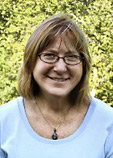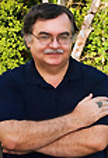This is the Hour of Lead--Remembered, if outlived, As freezing persons, recollect the Snow-First-Chill-then Stupor-then letting go.....
--Emily Dickinson, from her poem "After great pain, a formal feeling comes"
by Jack L. Kennedy
- Are you certain that you know who you are? Or where?
- And what if a magic potion or operation could increase your brain power, if not your sensitivity?
- Does Big Brother by any name in any time really know what is best?
Those are only three of the questions raised in The Hour of Lead (See Sharp Press) by veteran Pittsburg State University English professor Kathleen De Grave (assisted by her PSU library professor husband Earl Lee).


KATHLEEN DE GRAVE, at left
EARL LEE, at right
Craftily De Grave has borrowed words from the famed poet Emily Dickinson, and her attempt to communicate to the reader the nature of experience that comes "after great pain." It is subtitled A novel of Kansas and other alternate realities. To pique local curiosity the book is set in southeast Kansas and southwest Missouri in 2039.
To the book's compelling characters--and the reader-- the future is never very far away, the past too close behind to forget. The principal character, Weylan Collins, a scientist, wants to improve the future but is often drawn back to his past, we are led to believe, out of respect, fondness or fear.
The multi-faceted book with its turns and twists of plot and mood may remind the reader of an old television set, hard to control and stabilize at times. The minute the picture of what is happening seems clear, a different image flickers in. Control often seems to be a matter of definition and desire.
Weylan means well, but is thwarted when his plan to scientifically expand a young subjects brain goes bad. His plan seems like a good idea to him when initiated but he begins to wonder.
When a catastrophic event has slowed down time (the author was influenced by the Joplin tornado and the trauma it created), two protagonists are forced into confronting their pasts in order to mend their present broken lives. Images pop in and out of the story: a former college in Southeast Kansas, now taken over by the city and losing its old identity; recollections of grandpa of how the past has its influence on the present and future--whether we like it or not. There are memories of a changed intersection of Fourth and Broadway in some Southeast Kansas town. The reader is led to peek in on the enthusiastic Freedom Day festivities worldwide and ponder their meaning in his or her own era.
One major attribute of a flavorful, varied, compelling book is that it may be enjoyed on many levels by a whole range of different folks. This might be the perfect volume for someone who otherwise claims not to like the science fiction genre. It might make the reader debate the value of conscience and caring, and elevate the value of science and robotics and brain enhancement, allowing the transfer of power from the past. Are we really in a multiverse, in several states of being or time at once?
Or rather than think too much about the journey and why, just enjoy the ride. There is hope, in any time or place. Weylan seems to sense eventually that the present has always leaned on and learned from the past. Is scientific discovery all about power distribution in the conventional, political sense, or do individuals still make a difference? Is one's brain already powerful enough, or just misused? Does it need fresh nanobots?
Do you want to raise more questions of your own or just have a great literary journey? Then read on.

Title - The Hour of Lead
Author: Kathleen De Grave
Publisher: See Sharp Press (Sept. 1, 2012)
$10.54/paperback, $7.99 Kindle ed. (1032KB) at amazon.com/pp.300
ISBN-10: 1937276279
ISBN-13: 1937276270






Comments